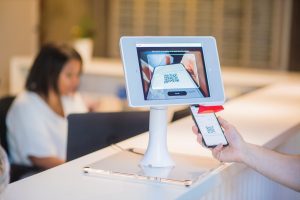Previously, we shared the article ‘What is Self-Sovereign Identity (SSI) and why is it important?’ Additionally, we also depicted what Buying a house with Self-Sovereign Identity would look like. Today,we take the discussion one step further by outlining four use cases of Self-Sovereign Identity (SSI).
In this article, we look at how SSI can solve everyday problems for financial institutions, external guests, motoring, and prescription medication. Altogether showcasing the strength and versatility of the SSI ecosystems and standards.
First, let’s briefly reiterate how SSI works from the human perspective:
- The passport office and other authorities (the Issuers) can issue digital credentials equivalent to passports, driving licences, proof of address, cinema tickets, immunisation status, phone number, etc.
- These credentials are stored in the owner’s digital wallet (a mobile phone app), and can be sent to a consumer (the Verifier), only if the owner consents to do so
- The Verifier can use cryptographic methods to verify the integrity of the credential
Self-sovereign identity builds on existing concepts, technologies and frameworks but standardises the underlining technical workings and opens it so that anyone can use it if they are compliant with the standard. It also introduced decentralisation to preserve privacy and provide more choice to people.
SSI for financial institutions

There are many potential SSI use cases which apply to financial services, but for now, let us focus on the “Know Your Customer” or “KYC” requirement. This requirement was introduced as a regulation to prevent fraud and criminal activity, but it has proven to be quite challenging to do well. Currently, the practice is to ask new customers for information when opening an account and maybe ask for the occasional update.
The first issue is that trained employees are needed to handle and understand the customer’s documentation, e.g. employees need to be able to tell if a passport is genuine. However, training takes time, costs money and does not fully remove the possibility of mistakes. Although financial institutions do what they can, some criminals may actually manage to open a bank account with a fake passport. SSI can remove the need for verifying physical passports by having the system verify the digital credential and simply display a green “tick” to inform the financial institution that the credential is valid. It is that easy.
Keeping customer information up to date is the second issue. When a customer forgets to change their address, not only does it result in bad customer experience, it is also non-compliant with financial regulations and can even open the door to potential fraudsters and scammers. Using SSI, institutions could simply ask their customers to share the most up to date credentials when they log-in to their digital banking service. This process would take less than 10 seconds, saving the time of, say, a customer phoning in to change an address.
SSI for external guests
Business travellers know the technical perils of visiting the offices of another business. Visitors usually have to go through security, show their passport, get a pass, get Wi-Fi credentials and other hurdles dealing with the issue that they are just visiting. SSI can make this process a lot smoother.
The host can issue an SSI credential to the visitor’s wallet confirming their status as a visitor, expected visitation dates, times, name, photograph, host’s name, permission to access Wi-Fi, and anything else deemed relevant. This credential arrives in the visitor’s wallet via QR code or similar before their arrival.
On the day of the visit, guests can share the credential as well as their name from their passport credential, previously issued by the passport office. Door security can verify that (a) the expected visitor’s name matches the passport name, (b) the photograph matches, (c) the time and date are correct etc.
Accessing Wi-Fi and other services would also be simplified. Instead of entering a guest username/password, visitors can scan a QR code and share the credential giving them access to guest Wi-Fi network. At the end of the visit, when visitation times expire, all credentials are automatically invalidated by the SSI.
This use case is not only applicable to business visitors but any other type of visitor. Further use cases along similar lines may include hotel visits, (air) B&B, car rentals, and access to any semi-public area etc. It is also possible that checks can be automated, removing the need for a real person to be present to check visitors in.
SSI for motoring and insurance
Although we may not always realise it, there are a lot of “credentials” involved in using a car. Let us look at how SSI can improve the  case of the handling of a minor accident. This example is a bit vague due to the array of possibilities.
case of the handling of a minor accident. This example is a bit vague due to the array of possibilities.
When it happens, both drivers need to trust that the other driver has valid insurance, given their real name and details. For this reason, we often have to wait for the police to arrive, even for a minor accident. SSI could remove this burden and could also improve privacy. Instead of drivers exchanging information on a piece of paper, they can both make a declaration of the accident directly to their respective insurance providers, and both drivers can share their related SSI credentials with the insurance provider instead of the other driver.
Then, let us say, the driver who is not at fault takes their car for repairs. The insurance will pay for it, but to do so, they have to first communicate with the garage. SSI could bypass this by the insurance provider issuing a credential to the driver to confirm the vehicle’s eligibility for a repair paid by the insurance company.
While in the garage, the driver can share their name and other information as a credential, saving time and the need for spelling long names, reducing human error. They could also receive a credential enabling them to pick up the car when it’s done. This credential can be delegated to someone else as well in a similar manner to the use case below. If the driver has decided to wait while their vehicle is repaired, they could use SSI to get easy access to the guest Wi-Fi network (as explained above).
Once everything is done, the driver receives a credential showing the repair, the warranty, and the fact that the garage was an authorised repairer for the car. This last one would be useful to the driver when they sell the vehicle in the future, even if the garage has since closed down.
SSI for Prescription Medication
Another area where SSI can help achieve everyday activities more smoothly is with prescription medication. Each country’s process differs slightly, but the basis is usually the same: go to the doctor, get a prescription, go to the pharmacy, show the prescription, get the medicine. SSI can modernise the process by creating a prescription in the form of an SSI credential, with some obvious, and some not so obvious benefits.
doctor, get a prescription, go to the pharmacy, show the prescription, get the medicine. SSI can modernise the process by creating a prescription in the form of an SSI credential, with some obvious, and some not so obvious benefits.
The physical presence of a doctor may not be required. If the issue does not require a physical examination, then the doctor can be consulted via video conference and the prescription credential issued remotely via the system. This applies to many medical issues as well as repeat prescriptions and even allows emergency access to medicine if a person is travelling abroad.
The physical pharmacy is definitely not required. The medicine can be bought online, and the pharmacist would be able to verify the recipient (e.g. name from passport), their shipping address (e.g. from driving license) as well as the prescription itself (from the SSI credential). The pharmacist can then send the medicine over via delivery, and the delivery driver can verify the recipient again using SSI themselves.
Delegation is also possible with SSI. People can produce a cryptographically backed delegation for others to do things on their behalf. This is a unique and not fully developed feature, but it is coming on SSI soon. The process is simple, once the patient has the digital recipe, they can name another person who can pick it up for them. The delegate can then buy the medicine from a physical or online pharmacy.
SSI for everday life
We have showcased how SSI can benefit multiple sectors of everyday life, business, health, travel, etc. Although these are future use cases, SSI is here and with our examples we have built the case for why it is here to stay.